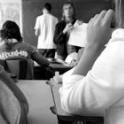We are celebrating the 10-year anniversary of Debats d’Educació by giving the educational community the opportunity to air its views

Lecturer in Sociology at the UAB and Professor of Education and International Development at the University of Amsterdam. Director of the research group Globalització, Education and Polítiques Socials (GEPS) – Globalisation, Education and Social Policies.
The three things I’ve learned
Fairness and quality as inseparable objectives
The time when fairness and quality were seen as a trade-off in education policy has passed. International research shows us that, not only is there no incompatibility between quality and fairness, there is also a positive relationship between the fairness of education systems and results in competence tests. Promoting measures to make education systems fairer is therefore not only a necessary measure from the point of view of equality of opportunities and social justice, it is also positive from the point of view of efficiency.
Fairness and quality of systems and subjectivity policies
Constructing a fair, quality education system requires working on two levels. On one hand, it is necessary to ensure maximum quality and fairness in the system. This has implications for aspects such as setting learning targets, the fair distribution of pupils – preventing excessive concentration – and training quality teachers with capacity for innovation. On the other hand, as Tedesco reminds us, the system’s policies have to be accompanied by subjectivity policies that are flexible enough to make schooling meaningful for young people and teenagers. School failure has more to do with a crisis of meaning than with faults in the way the curriculum is put across. The pupils who are most distanced from the system need to be able to construct a plan for life and establish the relationships of trust they need to make their time at school meaningful for them.
Constructing fairness in non-formal and informal education
Spaces for learning outside school are becoming increasingly important in vocational and social skills and competence training. In fact, every day, in terms of importance as central learning institutions, schools are losing ground to informal mechanisms activated via technology and the social networks. Beyond the need to reinvent schools in this scenario, it must be borne in mind that schools can be infinitely more egalitarian than non-formal education, access to which is strongly conditioned by financial resources. Today, finding formulas to compensate for social inequalities of access to non-formal training is becoming an essential requirement in order to ensure fair access to quality skills and competence training which is necessary both for access to the employment market and even for social inclusion.















 The texts published on this website are, unless otherwise indicated, covered by the Creative Commons Spain Attribution 3.0 licence. You may copy, distribute, transmit and adapt the work, provided you attribute it (authorship, journal name, publisher) in the manner specified by the author(s) or licensor(s). The full text of the licence can be consulted here:
The texts published on this website are, unless otherwise indicated, covered by the Creative Commons Spain Attribution 3.0 licence. You may copy, distribute, transmit and adapt the work, provided you attribute it (authorship, journal name, publisher) in the manner specified by the author(s) or licensor(s). The full text of the licence can be consulted here: